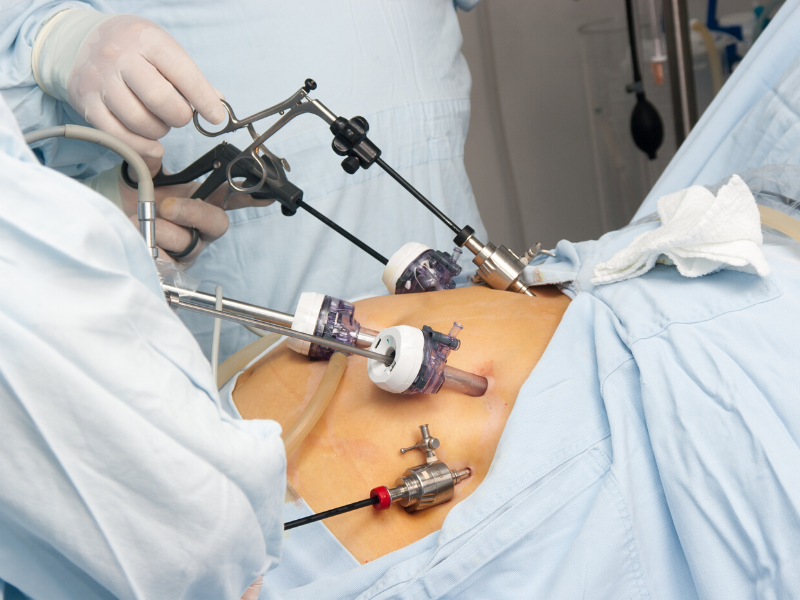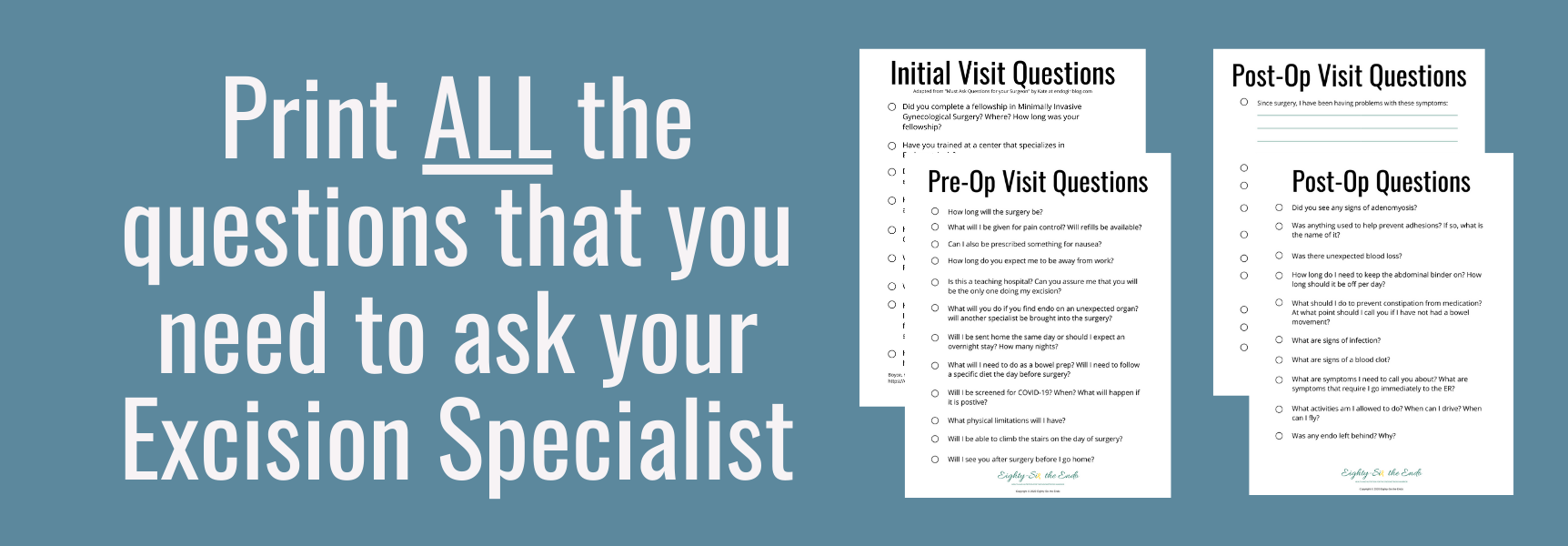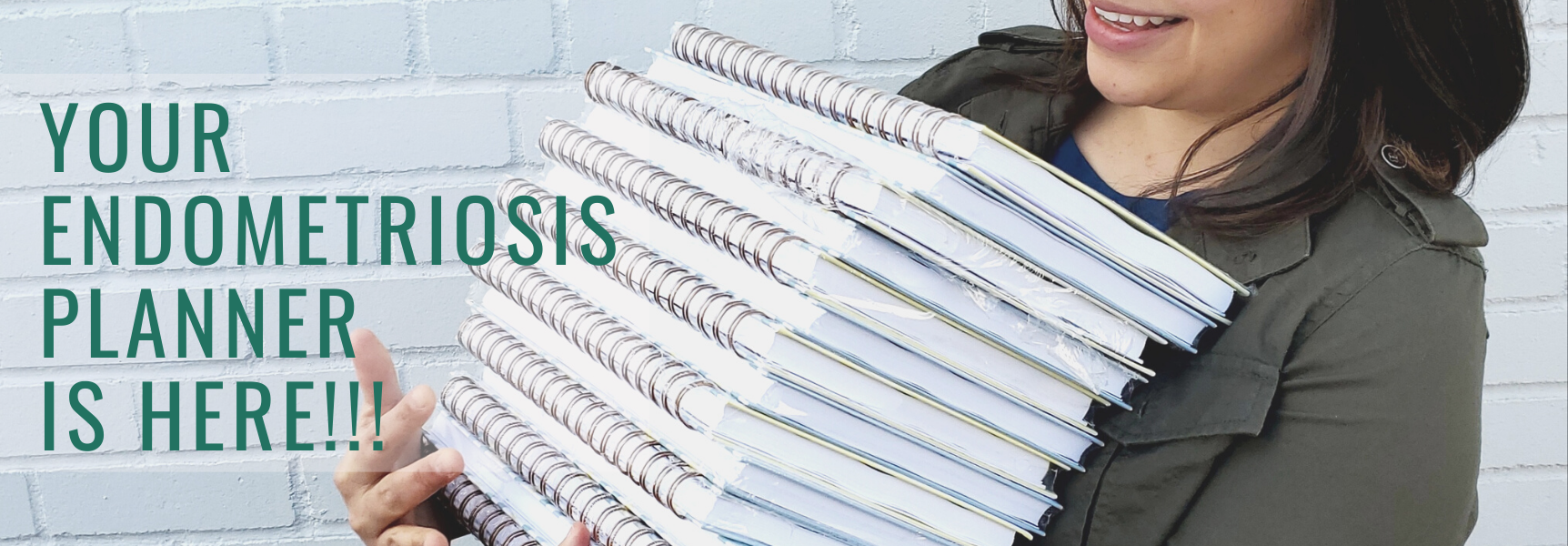I am now almost 5 weeks post-op from my excision surgery, and I have received countless messages asking me about questions to ask your endometriosis specialist. Some people asked me about the questions I ended up asking my surgeon at my pre-op visit (after sharing that I was writing them out on my Instagram story).
Some people have asked me about what to look for when searching for an expert excision specialist. And most recently, someone asked me what to ask at the post-op visit. I always do my best to answer their questions and provide them with resources, but I noticed that I could never find a post that combines it all. And although I know what questions to ask or what to look for myself, I also know that not everyone has a medical background.
So HERE IT IS! A comprehensive post with ALL the questions to ask your endometriosis specialist!
Talking to Your Doctor
But before I get into it, I want to give you a little bit of advice on how to bring up these questions with your doctor; especially for your first visit. Because, as much as I hate this, the truth is some doctors don’t like to be questioned about the way they practice. They get irritated and arrogant when you start to ask detailed questions.
But, even if they have some sort of God complex, you have every right to ask questions and you should never let a doctor intimidate you and make you feel like your questions aren’t worth answering. And if they give you that feeling, then it may be time to look for another doctor.
So here is a basic spiel that I like to share with doctor’s when I am, quite frankly, interviewing them.
“Because I have seen so many doctors and had some poor experiences, I have done a lot of my own research. I’ve read journaled articles and joined lots of online endometriosis support groups. So, I have a few questions for you that will help me get a feel for how well we can work together to address my pain.”
In my experience, this lets the physician know that you have researched credible resources and really care about working as a team with them. They usually appreciate this and will be more than willing to answer your questions.
Okay, without further ado, let’s get into the questions.

Initial Visit Questions
Adapted from “Must Ask Questions for your Surgeon” by Kate on Endo Girls Blog (1).
Did you complete a fellowship in Minimally Invasive Gynecological Surgery? Where? How long was your fellowship?
A fellowship in MIGS is the first sign of good news, but definitely not the only thing to look for.
Have you trained at a center that specializes in Endometriosis?
Some physicians will take the time to do extra training at places like the Center for Endometriosis Care. This tells you they are more invested in endo patients.
What is your take on using hormone therapy for endometriosis? What about GnRH drugs?
Some physicians believe that these drugs will “cure” you of endometriosis? And some use GnRH drugs to “take care of any left behind endometriosis after surgery.” These are red flags, and tell you that your physician is misinformed.
However, the use of these medications are not entirely bad. They have been helpful in decreasing symptoms for some people. But their side effect profile is large and sometimes irreversible. If your doctor wants to start you on these medications, I highly suggest you listen to the In Sixteen Years Podcast, as they have an entire series on Lupron and Orlissa (GnRH drugs). Listening will help you have FULL informed consent, since many physicians are misinformed about these drugs.
The episodes about Lupron and Orlissa are episodes 30, 31, 33, 37, and 39.
Do you have a multidisciplinary team in place for extrapelvic endometriosis?
Excision experts are experts in endometriosis excision, but they are not experts in surgically removing endo from all areas in the body. If there is suspicion for endometriosis on the bowel, kidneys, ureters, lungs, diaphragm, or other major organ, they should be consulting a specialist in the department (i.e. surgical gastroenterologist for bowel endo).
How many cases of endo do you do per year?
The best endometriosis specialists do about 150-200 cases per year. They don’t do obstetrics, since most of their time is spent with endometriosis or pelvic pain patients. If your surgeon is delivering babies most of the time, they likely don’t have the skill to be an expert excision specialist.
How do you surgically approach endo? Excision or Ablation? Can you describe to me the difference?
You are looking for an expert in excision. Ablation is what is taught to most Ob-Gyns, and often leaves patients in more pain and has higher chance of recurrence. And it’s a good sign when a doctor is willing to take the time to explain the difference.
What specific tools and heat sources do you use? DaVinci Robot? Lumeris? Other?
The tools used are not as important as the skill level of the surgeon. But the heat source they use can give you a clue as to whether they use ablation.
Many excision specialists (not all) use a CO2 laser, but this laser can be used for both ablation or excision. So ask them how they use the laser. If they say any words that suggest they burn, cauterize, or fulgurate the tissue, then that’s a red flag.
What are your recurrence rates?
Excision has a very low recurrence rate, as low as 7% (1). Ablation has a high recurrence rate of 40-60% (2).
If your doctor says that you will have to have surgery every few years, that’s a red flag.
How do you help manage your patient’s post-surgery? Immediately after and long term? Do you recognize Pelvic floor physical therapy as a good resource for pre- and post-surgery care?
In the book, Beating Endo: How to Reclaim Your Life With Endo, the authors go into the many non-surgical ways to control endometriosis symptoms. One of them being, Pelvic Floor Physical Therapy.
If your doctor acknowledges that a holistic and multidisciplinary approach is best for endometriosis then this is a good sign.
How do you help conserve reproductive organs? Do your patients have success with conceiving post-surgery?
Although not always possible, the goal of excision is to cut out all endometriosis while maintaining the function and health of the organs it can effect. This includes the reproductive system. Many endo warriors are also diagnosed with infertility, so if you are wanting children, this is an important question to ask.
How do I need to prepare for traveling to and from surgery?
If you live in the city where your surgeon is, then this may be as simple as making sure you have someone there to drive you to and from the hospital.
But more often than not, you will have to travel to your endometriosis excision specialist. Asking them about this will help you prepare for plane tickets, car rides, hotel stays, etc.

Pre-Op Visit Questions
How long will the surgery be?
Excision of endometriosis can take several hours. If they say that surgery will be 1 hour, that’s a red flag. Many excision specialists will say 2-3 hours, but follow that with, “it depends on what we see.” Some excision surgeries can take 8-10 hours.
What will I be given for pain control? Will refills be available?
Many surgeons do not prescribe narcotics past the first few weeks of post-op recovery and will only provide 1-2 refills if you call saying you are still having surgical pain. This, in part, is due to our the opioid crisis in the medical care system. But even so, you have a right to pain control.
It’s good to know ahead of time if you will need to see your primary care physician or pain specialist to manage pain as you recover.
Can I also be prescribed something for nausea?
Surgery, anesthesia, and the pain medication you take at home can cause nausea. It’s good to ask for something like ondansetron or another anti-nausea medication.
How long do you expect me to be away from work?
Some surgeons will say 2-3 weeks, others say 6-8 weeks. It really depends on your doctor, your medical history, and how your surgical recovery goes.
Is this a teaching hospital? Can you assure me that you will be the only one doing my excision?
Teaching hospitals are amazing! They are usually filled with skilled experts in every field and help to mold future physicians.
But since I worked so hard to get to where I am, I made sure my doctor was going to be the only one doing my actual excision. The fellows could assist with opening and closing, but I didn’t want anyone but my surgeon doing the excision part.
Yes, the fellows need to learn. I completely get that. But I made my wishes known.
You will have to decide what you are comfortable with and make sure you express your wishes.
What will you do if you find endo on an unexpected organ? Will another specialist be brought into the surgery?
Sometimes patients may not have symptoms or signs that suggest that endometriosis will be found on something like the bowel. But in the case that it is found, you’ll want to make sure that your surgeon has a doctor that he usually calls in during surgery.
Or you may find out that the surgeon will decide to address it in a separate surgery. Either way works, but it’s good to have a general idea of what will happen.
Ideally you will want everything done in one surgery, but sometimes it’s safer to separate the surgeries, and it’s up to your surgeon to make that call.
Will I be sent home the same day, or should I expect an overnight stay? How many nights?
No matter the answer to this question, always pack an overnight bag to take to the hospital. Just in case plans change after surgery.
Things may go perfectly in surgery, and your surgeon may say that you can go home on the same day. But if you cannot urinate or your pain is severely uncontrolled, it’s likely that they will keep you overnight.
What will I need to do as a bowel prep? Will I need to follow a specific diet the day before surgery?
Prepping your bowels before surgery is done for your safety. Cleaning out the bowels helps to make sure that if something happens (perforation or they need to cut into it) then you are less likely to get an infection.
Some doctors will do GoLytely, which is a liquid medication used for colonoscopy prep. Others will have you pickup a few things from the drug store, like magnesium citrate and fleet enemas.
You also might have to follow a liquid diet the day before surgery. You will need to avoid drinking liquids that are red or orange in color, since they can look like blood in surgery.
Will I be screened for COVID-19? When? What will happen if it is positive?
We are living in a new world, and COVID-19 screening is a new necessary evil. Many surgery sites are running a COVID-19 test the day before surgery and requesting that you quarantine at home after your test.
The test is a deep nasal swab and, to be honest, it feels like they are scraping your brains out, but its a very necessary test. I found it easiest to close my eyes and take deep breaths through it.
If you come up positive, this will affect your surgical date (most likely). I truly hope none of you come up positive the day before surgery, or ever for that matter.
What physical limitations will I have?
Oftentimes your mind will tell you that you are able to complete a task like vacuuming or laundry, but your body may say otherwise.
The best thing to do, other than listening to the guidelines that your doctor gives you, is to listen to your body.
Will I be able to climb the stairs on the day of surgery?
This questions is especially important if your bedroom is on an upstairs floor or basement. Personally, my bedroom and all the showers are upstairs, so I was nervous that I would have to sleep on the couch and not shower for a few days.
However, my doctor said it was okay to climb the stairs on the day of surgery, and to stay up there for a few days before doing it again. I was very surprised by how easy it was to climb the stairs when I got home, but it was definitely because I still had IV pain medication in me.
No matter the answer, always make sure you have someone with you during that first week. Safety first! You are at high risk for falling with all the pain and pain medication you will be taking.
Will I see you after surgery before I go home?
Many surgeons will come see you and your family while you are still sedated. Knowing this, I gave my husband the list of questions to ask for me. It’s always helpful to be prepared.
Post-Op Questions
- Did you see any signs of adenomyosis?
- Was anything used to help prevent adhesions? If so, what is the name of it?
- Was there unexpected blood loss?
- How long do I need to keep the abdominal binder on? How long should it be off per day?
- What should I do to prevent constipation from medication? At what point should I call you if I have not had a bowel movement?
- What are signs of infection?
- What are signs of a blood clot?
- What are symptoms I need to call you about? What are symptoms that require I go immediately to the ER?
- What activities am I allowed to do? When can I drive? When can I fly?
- Was any endo left behind? Why?
Post-Op Visit Questions
- Since surgery, I have been having problems with these symptoms: _______________________
- Did the pathology reports confirm endometriosis?
- Can I have a printed copy of the pathology report and the operative note?
- Did you take pictures or record the surgery? How do I get a copy of those? Where is the medical records office?
- What should I expect with my menstrual cycles moving forward? Will the first couple be more painful?
- Can you confirm what stage endometriosis I have?
- If total/partial hysterectomy was not done: Now that you’ve seen/ removed the endo, what do you think about my chances of conceiving?
- When can I start looking into pelvic floor physical therapy?
- What’s the next step in my treatment plan?
- When can I return to work? Will I have another appt with you before I return to work? *Be sure to bring any medical leave paperwork with you to the appt


- Boyce, K (2019). Must Ask Questions For Your Surgeon. Endo Girls Blog. Retrieved June 15, 2020, from https://endogirlblog.com/surgeonquestions/
- Center for Endometriosis Care. (n.d). Excision of Endometriosis. Center for Endometriosis Care: A Legacy of Excellence in Endometriosis Care. Retrieved June 18, 2020, from http://centerforendo.com/lapex-laparoscopic-excision-of-endometriosis



